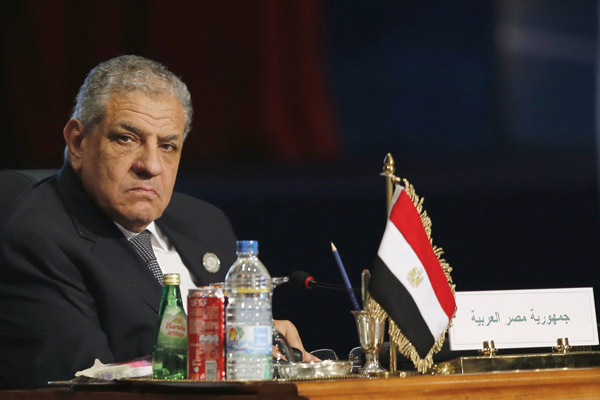by Maye Kabil
After a long delay, the government approved the draft budget for the year 2015/2016, on the first day of Ramadan holy month. The draft, which has yet to be approved by the president, raises much more questions than it offers answers.
The projected deficit for this year is 9.9 per cent of GDP, slightly narrower than the expected gap of the current fiscal year, which is estimated at 10.8 per cent. In pounds, that makes 281 billion compared to 240 billion that was approved in the 2014/2015 fiscal year budget.
On a longer term the government is aiming to decrease the deficit to 8.0-8.5 per cent of GDP in 2018/2019 as well as lowering public debt to 85 per cent.
The draft does not clarify the possibility of meeting the deficit goal while increasing the expenditure and decreasing the targeted revenues.
The budget proposal estimates the total expenditure to reach 885 billion pound. About half the public spending will be directed to social programmes with an increase of 12 per cent on the current fiscal year, according to the ministry of finance.
Reducing the deficit in such context would mean cutting other parts of the expenditure like fuel subsidies for example, but this does not seem to be the case. The budget statement lacked any mention of fuel prices increases. Hermes also does not expect fuel subsidy cuts this year as it would ignite too much inflation.
However, the government is counting on savings from lower oil prices.
Egypt reduced its petroleum product subsidies allocations to EGP 61bn in the budget of the new fiscal year, according to a press release for Tarek El Molla, Egyptian General Petroleum Corporation (EGPC) Executive Chairman, statement.
According to El-Molla, the petroleum product subsidies will be EGP61bn in the 2015/2016 budget. The allocations of the petroleum product subsidies were based on major determinants. “The first is estimating the global price of the Brent crude by $70/barrel on average,” El Molla said. He expected to positively contribute to reducing the bill of importing the crude oil and some petroleum products, as well as the natural gas, during the year.
El-Molla said the second determinant is converting the cement industries to use coal as source of energy, which would lead to reduce the amounts of natural gas and mazut that these industries were used.
He mentioned that the last determinant relies on settling a plan to rationalize fuel consumption by 3% to 5%, to save an expected amount of EGP 3-4bn.
However, postponing the implementation of the fuel cards makes it harder to rationalize the consumption. In addition, most cement firms did not yet start using coal as fuel.
But the implementation of the second round of electricity fuel price will be a key reform measure this year, as Hermes expects. The increase, in line with the five-year subsidy reduction plan in the electricity sector announced last year, is planned to be implemented in July. As per the President’s directives, the first three tranches of consumer brackets will be exempted from this year’s increase. This will be compensated for by bringing forward next year’s price levels for the higher three brackets to this year in a message by the government that rich segments of the population will be carrying the burden of reforms, as per the Minister of finance’s statement.
The other side of the budget draft projected public revenues to stand at about 612 billion Egyptian pounds with an increase of 26 per cent.
In spite of this growth projected revenues from taxes will raise slower than previous years since its rate will be 15% year on year, compared to 26% in the current fiscal year. Taxes revenues in the current draft budget stood at 422 billion Egyptian pounds.
Officials assured that many measures that were implemented to encourage investment, will affect the expected taxes revenues in the new fiscal year.
Canceling the 5 per cent tax that was imposed on the wealthiest tax payers, and reducing the highest taxes to 22.5 per cent on persons and companies, down from 25 per cent, were among such measures; in addition to postponing the implementation of the capital gain tax for two years.
The minister of finance highlighted the partial implementation of the value added taxes (VAT) to be a main contributor in financing the budget deficit. However as the investment bank EFG Hermes comments in a note about the budget, the timing and magnitude for applying this tax is “yet unclear”.
Hermes says that the VAT will have to be implemented next year in order to maintain the deficit on a narrowing trend though with a likely lighter version in order to avoid igniting too much inflation.
On the other hand the draft budget showed a notable decline in grants compared to previous years, in which Cairo has received billions of dollars in grants, loans and petroleum products from Gulf Arab allies after overthrowing Ex-president Mohammad Mursi in 2013. “Such consolidation is budgeted despite the considerable decline in grants which are set to slide to only EGP2.2 billion in FY2015/16 from EGP25.7 billion in FY2014/15 and EGP95.5 billion in FY2013/14” according to Hermes.
The budget draft is under revision by the president now, and is expected to be approved before the end of the current fiscal year, by the end of June.
The financial statement of the current year budget was first published on the second of July, two days after the beginning of the new year.
Experts are waiting for the detailed version of the budget to get more clarification on the way by which the government is intending to narrow the financial gap and achieve the announced deficit target.


